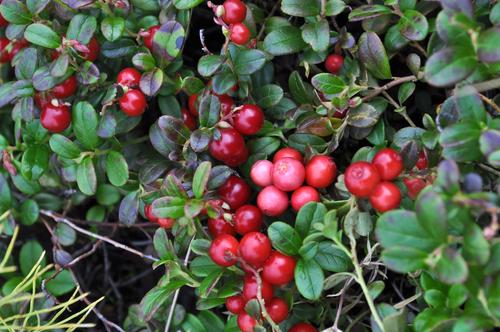Cranberries (or their juice), those staples of Thanksgiving feasts, have been garnering attention for years as possible treatments for urinary tract infections (UTIs). There have been studies supporting such uses, and we have written that perhaps this "old wives' tale" merits more respect. But a new, randomized, controlled study of the efficacy of cranberry in treating UTIs in elderly women has kind of pulled the rug out from under this particular idea.
Cranberries contain compounds known as proanthocyanidins, which have been shown to inhibit the ability of E. coli bacteria to attach to cells in the urinary tract. Dr. Manisha Juthani-Mehta and colleagues from Yale University noted that previous studies of cranberry products had provided conflicting results. They suggested that this may have been because the juice or other products consumed in those studies didn't contain enough proanthocyanidins to affect the bacteria. Thus, they gave 185 elderly women (mean age 85 years) living in nursing homes either two capsules of cranberry per day or placebo capsules for a year. Only women were included, the authors stated, because they comprise the majority of nursing home residents, they are more likely than men to have UTIs, and previous studies examined women, and they wanted to be able to compare results. The cranberry capsules each contained 36 mg of proanthocyanidins — an amount demonstrated to be effective in an earlier study, and equivalent to the amount found in 20 ounces of cranberry juice. Their study prescribed this treatment for one year and looked at the effect of the treatment on the presence of bacteria and white blood cells (bacteriuria and pyuria) in these women.
Urine samples were obtained at baseline and every two months for a year. Over that period there was no reduction in the percentage of women who had bacteriuria and pyuria whether they had taken the cranberry capsules or the placebos. The authors noted that providing the proanthocyanidins as capsules meant that participants were not getting the hydration they would have received from drinking the equivalent amount of juice — they cited another study that found an effect of cranberry capsules on UTIs, but which also required hydration. Thus one might ask whether the key to the amelioration of UTIs depends more on hydration than on the consumption of cranberry or other supplements.
In an accompanying editorial, Dr. Lindsay E. Nicolle from the University of Manitoba, also refers to the lack of consistency of the results of studies of cranberry and UTIs, although the issue has been studied for "nearly 100 years." She also notes that unlike in the present study, criteria for the diagnosis of UTIs have not always been precise, adding to the uncertainty of the results. Thus, studies with appropriate methodologies seem to have negative results, while those with positive results (i.e., showing an effect of cranberry) are less well-designed or carried out. In sum, she concludes:
"The continuing promotion of cranberry use to prevent recurrent UTI in the popular press or online advice seems inconsistent with the reality of repeated negative studies or positive studies compromised by methodological shortcomings. Any continued promotion of the use of cranberry products seems to go beyond available scientific evidence and rational reasoning. "
Does that mean you can expect to see less advertising of cranberry juice for UTI relief? Probably not. But there's no harm in enjoying cranberries in whatever format that appeals to you.




